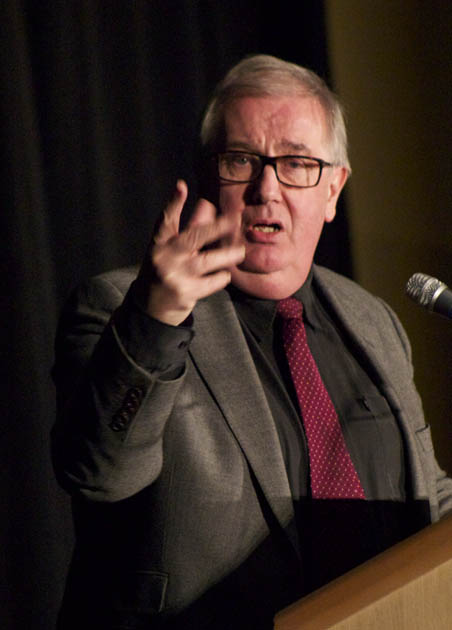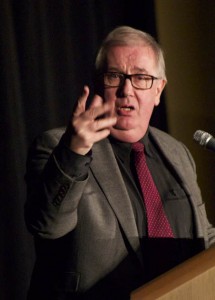Great Issues Committee Speaker Michael Cox began his presentation with a brief apology. He did not apologize for his message or his views, but for the title of his speech.
“It’s a bit provocative in a way,” Cox said, “It’s got that word, ‘empire.’ I don’t mean it by a criticism. Not all empires are bad. Empires can be positive sometimes.”
Cox, who is currently a professor and chair of International Relations at the London School of Economics, gave his speech to an audience of approximately 100 people on Feb. 9 entitled, “President Obama and the end of the American Empire.” While the speech did not really address Obama’s impact on “the American Empire,” Cox did focus on what is being seen as an economic decline of America as a superpower.
“It’s not the same world any longer,” Cox said. “It’s not the same America with the same level of self-confidence.”
Cox broke his speech down into three main points. The first asked: if there is a decline in American power, is there a power shift going on? More specifically, is power shifting from the Western world to Eastern emerging markets like China?
“There is a kind of feeling something big, historic [and] structural is happening in the balance of power in the world,” Cox said. “This is also tied to something else, namely that the balance of historic power is moving from the West to the East.”
According to Cox, the axis power has always been the Atlantic, or the power of the European nations combined with America. But as this power dwindles, it’s not unreasonable to think that this power shift to the East will be “the big one.”
If there is a power shift going on, this has created a lot of tension between the East and the West, as the shift can go in a variety of directions, Cox said.
“This will challenge the United States, and China cannot rise peacefully. It may want to, and it doesn’t matter that it’s run by the communists,” Cox said. “It could be run by Mickey Mouse. As long as its run in China with 2.2 billion people working 24 hours, out-producing everyone else and becoming the second largest economy in the world— but this is an emerging power.”
With China’s economy rising at the rate that it is, Cox said he thinks the United States is most likely in for a rough time. According to him, there are two ways America could approach the new power balance. The U.S. could perceive it as threat, or teach China to be good capitalists and integrate them smoothly into the world economy, Cox said. But he said he worries that however this happens, the shift will come with conflict.
“It’s like two sides of the panda: there’s the cuddly bit and the one with claws,” Cox said.
Cox’s second point questioned everything he had said in the first part of his presentation.
“Is what I’ve said so far completely true? Is America in decline? Is the West in decline? Is the trans-Atlantic region in decline? Is everything really moving towards the East and Asia?”
Cox said that there are obviously shifts happening, at least in the economic sense. But while countries have just started to accept help from China, in time of real distress, it is still Washington they want to talk to. He attested that China still has a long way to go, especially since it is a communist country running a capitalist system. He does not believe America is about to collapse, but he does not necessarily think China will fail either, as they have had the chance to see what happens when powers arise and what problems come with it.
“It will be complex. It’s not like a bumper sticker, it’s not a simple slogan,” said Cox.
His final point sought to sum up what his message really was.
“Is the west in decline? And this is a big one. Is economic power shifting to none western areas? Yes, emerging economies are emerging,” Cox said.
According to Cox, China has to be careful if it is to act assertively, as the result could backfire on the country. They will lose support if people get scared. The West, while in decline, will not die anytime soon. He attests that the concept of western culture is still alive and kicking. Cox believes this should not turn into a competition, but as a way to create international connections like we have never had before.
“He had a unique point of view and knowledge,” freshman Josh Buechler said after the speech. “It was good that he recognized biases and I enjoyed his message about keeping balance.”










